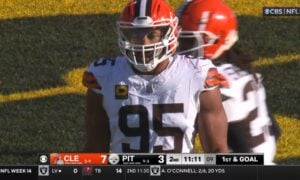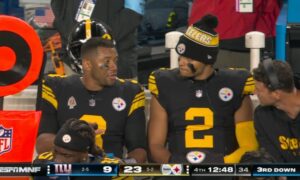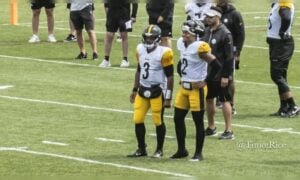Pittsburgh Steelers running back Le’Veon Bell appeared Friday on the AP Pro Football Podcast hosted by Rob Maaddi to talk about the state of the running back market. Bell was particularly incensed by the fact that New York Giants QB Daniel Jones, whom he called a “bottom-tier” quarterback got paid this offseason with a long-term contract while Giants RB Saquon Barkley did not.
“Daniel Jones, he’s in the bottom tier. He’s in the bottom tier of NFL quarterbacks,” Bell said. “He’s not mediocre. There are average quarterbacks, he’s in the bottom tier. I’m not here trying to talk bad about Daniel Jones. I’m just trying to be real for everybody’s who’s hearing it. He’s in the bottom tiers. Saquon [Barkley] is in the top tier of his position, just running back. So how does that make sense?”
Bell also said that those sort of contract issues can end up spilling over to the locker room and cause chemistry issues.
“It subconsciously affects it,” Bell said. He said that while Barkley loves his teammates and doesn’t want to leave the Giants, it makes it hard for a guy to want to play for an organization that values other players more.
Jones had a solid season last year, throwing for 3,205 yards and running for 708 more while leading the Giants to the NFC Divisional Round. But Barkley was the engine of New York’s run-based offense, rushing for 1,312 yards and 10 touchdowns while adding 57 receptions for 338 yards out of the backfield. But quarterbacks are paid a premium, so Jones got his money while Barkley was franchise-tagged and eventually agreed to a reworked one-year deal with the Giants.
Whether or not Jones is a bottom-tier quarterback, the point is that Barkley was a key driver of New York’s offense last year, while Jones had his fifth-year option declined and ended up playing well in a prove-it year, and because he’s a quarterback, he got his money. Barkley meanwhile was left with the franchise tag despite arguably being the most important offensive player.
That’s life for running backs these days. Omar Khan said in his press conference yesterday that as quarterback contracts rise, there’s going to be a position group negatively affected, and right now it’s the running backs. Their shorter career spans cause them not to earn on their second contracts, and there’s no easy solution to fix it.
“You have your special quarterbacks like Patrick Mahomes, you got your Lamar Jackson or your Aaron Rogers, those special quarterbacks. But you also have those special running backs that you’re not about to just [get a] better substitute, you’re gonna lose a little bit off on special running backs,” Bell said. “Like how I was. I’m not trying to say I was head and shoulders above any other running backs that played behind me, but every running back that played behind me can’t do what I do.”
Bell was the first running back to really make a stand, sitting out the 2018 season, but his career plummeted after that. It’s not really a viable option, especially with how bad the running back market is currently. It’s a no-win situation for most backs trying to earn a second contract.
But that’s the NFL these days. Mediocre or below-average quarterbacks can earn over $40 million a year, while running backs are struggling to get extensions with their own team. A solution is going to be discussed and tried to work out in the next CBA, but it’ll be difficult to get everyone on board for an easy solution. This is an issue that’s going to linger over the NFL for the next several years.








